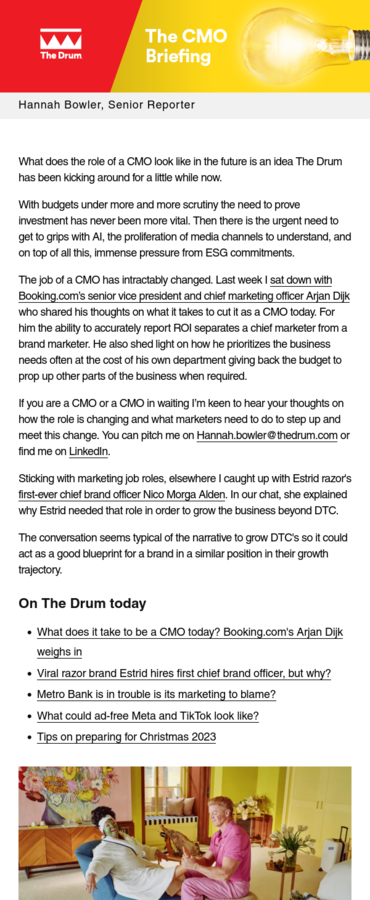Imposter syndrome: scourge of the marketing industry or buzzword?
Imposter syndrome is the fear of being ‘found out’ as underqualified for or undeserving of our jobs or successes. But is it something marketers feel deeply, or an unhelpful clustering-together of other problems?

Imposter syndrome: do you feel it? / Daniel Cheung via Unsplash / Lego
Back in March, Daniel Kwan of Daniels, the directing duo behind Everything Everywhere All At Once took his moment in the spotlight to share concerns about being “good enough” to be a storyteller. While accepting an Oscar, he said that his “imposter syndrome is at an all time high”.
What Kwan was talking about is a group of psychological phenomena whereby we can come to doubt the deservedness of our achievements, positions, or ambitions. Kwan isn’t alone: other high-profile people who have spoken about the phenomenon range include all-timers like writer Maya Angelou, Radiohead’s Thom Yorke and supreme court justice Sonia Sotomayor.
Since Kwon’s speech, it’s been a topic of particular interest in the LinkedIn discourses of marketers, including a perspective from Steven Bartlett: imposter syndrome as a ‘growth moment’. In the pages of The Drum, one senior marketer made an impassioned defense of doing what you love and being comfortable doing it. So: do most senior marketers relate to imposter syndrome? Is the concept useful or a distraction? We asked nine leaders from The Drum Network.
Sophie Wooller, chief operating officer, UK, Croud: “Imposter syndrome is a topic that has come up in almost every panel, fireside chat and training course we’ve run for Croud’s Women In Leadership network. It’s a very real challenge that the vast majority of our members are navigating (myself included).
“We teach marketers to measure everything, so can’t be surprised when we measure where we think we’re falling short. There’s always someone with more experience, better performance, or more technical knowledge. This is even more pronounced at a senior level; I lead teams where I understand maybe 10% of what they do. This is terrifying. Why on earth have I been trusted with steering this ship?
“But imposter syndrome can be a superpower. I might not know the deep specifics of my team’s roles, but I can ask great questions. And I’ll work exceptionally hard to support them to deliver their best work. I can’t do it on my own.”
Advertisement
Chris Moody, head of strategy, AgencyUK: “My version of imposter syndrome has been trying to live up to my own expectations of what other people might think of me: isolating, paralyzing sensations that come without warning and can last for days.
“In professional situations, this has been enabled and exacerbated by both individuals and organizational culture. Dominant personalities enforcing their agenda and dictating details; a climate of anxiety where everyone second-guesses everyone else, especially in larger companies, where operational and functional territories are clearly defined and defended.
“Reducing such toxicity is not driven by grand policy statements or commitments to mental well-being. It’s about a day-to-day culture of openness and active listening, where asking for help or advice is rewarding, where expressing doubt is encouraged.
“We all want to feel valued, personally and professionally, so let’s start by valuing each other honestly, authentically, every day.”
Hannah Dempsey, senior marketing director, Jellyfish: “Let’s not label it ‘a syndrome’; it’s more accurate to call it the ‘inner imposter,’ akin to your inner critic.
“This inner imposter resides in everyone, though we may use different terms to describe it. Entrepreneur Steven Bartlett’s perspective offers a refreshing twist: imposter feelings shouldn’t be a hindrance but a sign of personal growth and stepping out of your comfort zone. Embracing and reframing this concept in your mind can empower marketers to view their self-doubt as a catalyst for progress.
“Author Amy Kean’s insights highlight another critical aspect: imposter feelings can stem from poor leadership or management experiences. Identifying the root cause can be a crucial step in addressing and overcoming this common challenge. Personal growth, self-awareness, and open discussions can normalize the inner imposter, reminding us that it’s a natural part of the human experience.
“One way to combat the inner imposter is through open dialogue. Sharing my experiences with others and realizing that successful individuals also grapple with these feelings has helped calm those feelings for me.”
Advertisement
Geoff Griffiths, chief executive officer, Builtvisible: “Like many things, ‘imposter syndrome’ is an increasingly well-known label that describes an idea without any of the nuance or complexity that accompanies it, meaning someone either ‘has it’ or doesn’t, without any room between.
“It is a very real thing, and affects a wide range of people differently, but agencies are environments where exposure to new situations and challenges are all part of the experience, and where real personal growth and career development happens.
“We’ve embedded clinical psychologists into our teams to cut through the pop-science/social media view of things like imposter syndrome, and help people work on their self-awareness from a medical and evidence-based standpoint. It’s been transformational for some, and trumps the more generic wellness solutions out there.”
Ellie Malpas, strategist, Media Bounty: “I was born for the office. My parents called me ‘Helena’ so I could have a formal name for my 9-5 and be ‘Ellie’ on the weekends. My idea of office culture was therefore always one of corporate coldness. People in suits, discussing the weather by a water cooler.
“I was shocked on my first day in an agency, when someone shaved their beard onto another colleague’s desk.
“Not only did I have to navigate being in a workplace while still learning the actual job; I had to re-think my preconceptions about the boundaries of office banter. Double imposter syndrome. This left me in church-mouse mode for most of my early career, not quite ready to share my over-sharing tendencies. In my current job, I’ve finally learned to leave Helena behind and bring my whole Ellie self to work. I’ve learned and laughed a lot more because of it.”
Suggested newsletters for you
Charli Edwards, creative director, Cavendish Consulting: “Imposter syndrome is, for lack of a better term, a horribly destructive virus that can infect creatives at all levels. It’s not just about self-doubt, but also jealousy, fear, and the feeling that we’re not good enough.
“But there’s strength in vulnerability; discussing imposter syndrome openly and honestly can help normalize the experience and make it less isolating for others.
“Creative leaders must recognize imposter syndrome as a serious problem impacting the creative process and culture (jealousy is best friends with insecurity). By creating an environment of inclusion and belonging, where creatives feel safe to take risks and be themselves, we can help to remove the stifling barriers of imposter syndrome. But we can’t wrap creatives in cotton wool. We shouldn’t shy away from pushing people past their comfort zones. Providing constructive, supportive feedback is paramount. It’s how people learn and grow without feeling attacked.”
Mathilda Holmkvist, creative director, Nucco: “Imposter syndrome has always rubbed me the wrong way. A catch-all phrase that’s sometimes confused with a perfectly normal response to doing something outside of your comfort zone. That can be nerve-wracking, but the feeling usually subsides if you stick with it. Learning to trust your own work also helps.
“What built my confidence over time was developing my skills and gaining more experience. I’ve also had the fortune to feel supported, and promoted appropriately. It’s a privilege I don’t take for granted; others just as skilled won’t been as lucky due to systemic bias, discrimination, or unfair treatment.
“Imposter syndrome as a term is complicated; it can be an indication of an unhealthy work environment, putting pressure on the individual rather than a company's work culture. But the anxiety-inducing nature of attempting something new is just part of growing as a creative.”
Hannah Brady, senior content strategist, Connective3: “Imposter syndrome has been a constant companion throughout my marketing career. I’ve never really doubted my abilities, but even as a senior strategist, I’m always afraid of people realizing I’m just blindly winging it, and have been for 8 years. I don’t know if I’ll ever stop feeling like a fraud, even though I’ve worked unbelievably hard to get where I am.
“Having said that, sometimes I feel that imposter syndrome has made me better at my job. Because I’m not always confident that my way is the best way, I’ve been able to learn a huge amount from my peers, and find better ways of working without ego getting in the way.
“For example, I have ADHD, which makes me feel like I’m not matching my teammates’ productivity but by speaking to them about how they work, I’ve learned more effective ways of combatting my attention issues.”
Natalie Patel, managing director, Found: “Four words to describe what it felt like being appointed managing director of a fast-growing digital agency at the age of 30: ‘imposter syndrome on steroids’.
“I remember an overwhelming sense of pressure – but it was all coming from my own mind.
“A key turning point was reading management book The Chimp Paradox and working hard to train my brain to keep my cool when faced with triggering situations.
“I’m still figuring it out, but I have a completely different perspective, and now when I’m in high-pressured situations that previously would’ve caused me to feel an overwhelming sense of imposter syndrome I see that’s exactly where I’m meant to be, developing and pushing myself to get comfortable with being uncomfortable.”
Content created with:

Found.
WE ARE FOUND.
WE HELP BRANDS GET FOUND ONLINE.
We’re the digital performance experts who devise and deliver more opportunities for brands to...

Nucco
We make it beautifully simple.
We are communication experts that change behaviour and perspectives. B Corp certified and part of UNIT9, we are powered by...

connective3
We create market leaders. We do this through the application of digital marketing strategy, adopting SEO, Content Strategy, Digital PR, PPC, Display, Social Media...
Find out more
Cavendish Consulting
Creativity that counts.
Creativity is your secret weapon. It can educate, challenge and motivate. It can turn ordinary into extraordinary, and your audiences...

Media Bounty
We’re Media Bounty. And we’re working to become the UK’s leading ethical independent creative agency by 2026.
Our team delivers award-winning strategy,...

Builtvisible
We connect a digital society.
Made possible through technology, made personal through data, made powerful through content. Bringing people, communities and...

Jellyfish
Jellyfish is a marketing performance company for the platform world, where success demands a creative, multi-platform mindset. We help brands thrive, by navigating,...
Find out more
AgencyUK
We’re an independent brand communications agency voted Ad Agency of The Year 2019 and Brand Strategy Agency of the Year 2020 by Drum Recommends. Our services span...
Find out more
Croud
Croud is a global, full-service digital agency that helps businesses drive sustainable growth in the new world of marketing. With a rich heritage in performance,...
Find out more

